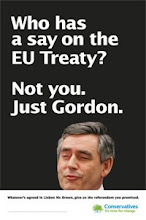Imagine that you had not watched or listened to yesterday's Prime Minister's Questions. Imagine that your first knowledge of what happened came from this heavily promoted BBC News article, what would your conclusion be as to the tone of the exchanges between Ed Miliband and David Cameron?
The article is headlined 'PMQs: Cameron faces Brooks LOL text jibe' and runs thus:
Watch the video and see what you think...
Mind you I don't think that PMQs should be reduced to a Britain's Got Talent type contest to see which party leader can make the best 'joke'. One other thing I noticed on the 5 Live coverage was that the Prime Minister was usually referred to as 'Cameron' whilst the leader of the opposition was referred to as 'Ed'. I seem to remember that Gordon Brown and Tony Blair were not generally referred to by just their surnames, but as Prime Minister or by forename and surname. Is this indicative of the difference in the BBC's feelings towards politicians they approve of and those that they don't?
The article is headlined 'PMQs: Cameron faces Brooks LOL text jibe' and runs thus:
'The Labour leader Ed Miliband has joked in the Commons about the prime minister's text correspondence with former News International chief executive Rebekah Brooks.Listening to 5-Live after PMQs, even the presenter (Shelagh Fogarty?) and John Pienaar agreed that David Cameron had won that exchange of pre-scripted jokes. However the BBC line must always be of Labour success and Tory disaster.
He suggested that after failing to meet with the new French president Francois Hollande last month, Mr Cameron should simply text him the message "LOL".
It comes after Mrs Brooks revealed during her evidence to the Leveson Inquiry last week that the PM had signed off text messages to her in this way, apparently believing it to be an acronym for "lots of love".
However, David Cameron reminded the House that former PM Gordon Brown had his own mobile phone issues, which some newspapers suggested he threw his at staff.'
Watch the video and see what you think...
Mind you I don't think that PMQs should be reduced to a Britain's Got Talent type contest to see which party leader can make the best 'joke'. One other thing I noticed on the 5 Live coverage was that the Prime Minister was usually referred to as 'Cameron' whilst the leader of the opposition was referred to as 'Ed'. I seem to remember that Gordon Brown and Tony Blair were not generally referred to by just their surnames, but as Prime Minister or by forename and surname. Is this indicative of the difference in the BBC's feelings towards politicians they approve of and those that they don't?









No comments:
Post a Comment